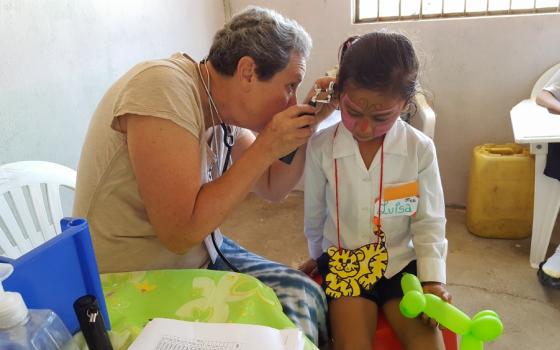On a mission experience sponsored by the Sisters of Charity of Seton Hill to Ecuador in July, the final day on the schedule said: Medical services and mini-Olympics in a distant village. For most of the participants on the trip — sisters, teachers and volunteers — it was hard to imagine a place more remote than the small town where we had helped at a school for children with special needs that is sponsored by the Korean province of the Sisters of Charity of Seton Hill. Because this was my fifth time accompanying the group and because we had visited the village in 2015, I knew what would be required to go the distance to the tiny place known as Luz de Esperanza (Light of Hope).
A truck converted to a passenger bus was contracted to carry the volunteers, visitors and teachers to the village. We packed five, six or seven onto benches arranged across the truck bed and still had several passengers who rode on the roof. Medical supplies, games, a microphone and amplifiers and several bags of balloons were packed on the back.
Although the distance is just about 20 miles, only the first 10 minutes was on paved road. Gravel gave way to dirt and on several occasions we felt a steep descent into riverbeds and held our collective breath as we made our passage across and up the other side. Our vision was limited to the open sides of the vehicle where we saw groves of mango and papaya and towering hardwood trees. The further we drove the narrower the road became and several times branches from the underbrush swiped those seated at the edges. Dust and diesel fumes swept in as well.
After an hour or so we began to stop to take on passengers, as impossible as it seemed that we could find more seats on the packed benches. All were heading to the school for our event and had traveled a great distance on foot to reach the road. "We must be getting close!" some of the visitors supposed. We bounced and jerked along for almost another hour before we reached our destination. Very quickly the vehicle was unpacked, a small "clinic" was set up in the sparsely furnished schoolroom and a tarp was raised over a nearby area for games and music.
Over the next several hours I offered some basic medical services to children who were pulled away from having their faces painted in order to receive treatment for "bichos" (parasites), runny noses and poor appetites. I never have high expectations about the impact of these "health fairs," but I know that for people who live in such remote areas the opportunity to consult a physician is appreciated. The fact that the speakers for the non-stop music were located immediately adjacent to our exam area made the medical encounters even less productive. We ended the clinic after seeing about 60 children and adults, just in time to join the rest of the group for lunch prepared by our hosts.
I was hot and exhausted but buoyed up by the knowledge that soon we would pack our bus and begin the trip home. I didn't know that the children had expected a soccer match before dismissal, and I was not the most enthusiastic spectator. The trip back to town was significantly different. Everyone was quiet and many dozed as we jolted along. There was less chatter, fewer scenic photo ops, and no cheery bus songs. We were spent.
The next day we had formal time to process the experience. What did we do? What did it mean to the people of Luz de Esperanza? Was it of value? Did we make a difference? More significantly, what did the experience mean to us? How have we been changed by the encounter?
My mantra for this journey to a distant village was the steady challenge of Pope Francis to go to the margins.
"Each Christian and every community must discern the path that the Lord points out, but all of us are asked to obey his call to go forth from our own comfort zone in order to reach all the 'peripheries' in need of the light of the Gospel." (The Joy of the Gospel, 20)
Having made the trip before, I had no romantic notions about what it would require of me. The movement to the margins is uncomfortable. The roads are never smooth, if there are roads at all. The beautiful new vistas eventually lose their appeal and the little whiner within begins to cry, "Are we almost there?"
The margins are not about comfort. Why should we ever expect that the trip, much less the destination, should be comfortable? How easy it is to complain about the hardships! How quickly the discomfort shows itself in heightened irritability, impatience, preoccupation with personal safety, physical symptoms like headache, nausea and dizziness, or a running critique of things that don't measure up to my standards. Caught up in the self-absorbed misery of the moment there is a great temptation to excuse myself from the mission at the margins.
For women religious, however, the call to the margins has never been clearer. Sr. Mary Sujita, a member of the Sisters of Notre Dame, in her address at the 2016 assembly of the International Union of Superiors General built on Pope Francis' refrain that we must "go out" in solidarity for life on the periphery. Speaking with the credibility of her missionary life among the marginalized Musahar people of northern India, she called a question for this Kairos moment:
The question is: Will those of us who are called to consecrated life at this time in the history of the world be women who will risk moving out of our securities and comforts (which we mistakenly perceive as our hundredfold for following the poor Man of Galilee!) and go out to the existential and geographical peripheries with the evangelical message of hope, joy and life to the full? Can we religious say with conviction and commitment that we do not want our charisms to be so institutionalized and centralized that we lose the 'prophetic sting' inherent in our call to close discipleship and mission? When we expose ourselves to the vulnerabilities of life and mission on the peripheries, we will discover our real identity and purpose in Christ.
So what will keep me moving to the margins? Left to my own devices I would certainly come up with some good reasons why I should be excused from all the "distant villages" of my world. Both Pope Francis and Sr. Mary Sujita recommend an antidote to the strong desire for comfort that could anesthetize me.
Let us cultivate the contemplative dimension [of life], even amid the whirlwind of more urgent and heavy duties. And the more the mission calls you to go out to the margins of existence, let your heart be the more closely united to Christ's heart, full of mercy and love." (Homily of Pope Francis, July 8, 2013)
When we are rooted in God, we will be impelled from within to move out of our comfort zones and be prophetic risk-takers and healers whose very presence and witness will challenge the oppressive and divisive powers in our society. (Address to 2016 UISG General Assembly)
The contemplative dimension of my life will root me in God and so equip me for the journey to the margins. At those peripheries of our world, geographical or existential, I will encounter Christ who both sends me and awaits me.
[Sr. Janet Gildea is a Sister of Charity of Cincinnati. A retired family physician, she now serves with her sisters at Proyecto Santo Niño, a day program for children with special needs in Anapra, Mexico, as well as ministering with young adults in the Diocese of El Paso, Texas.]





